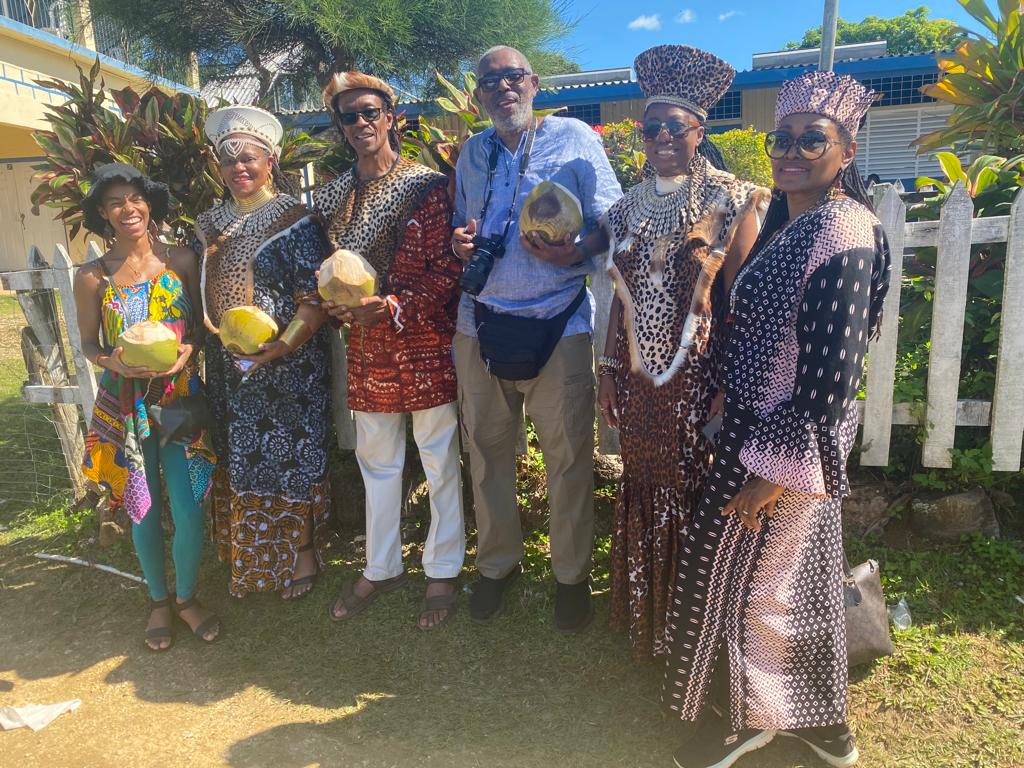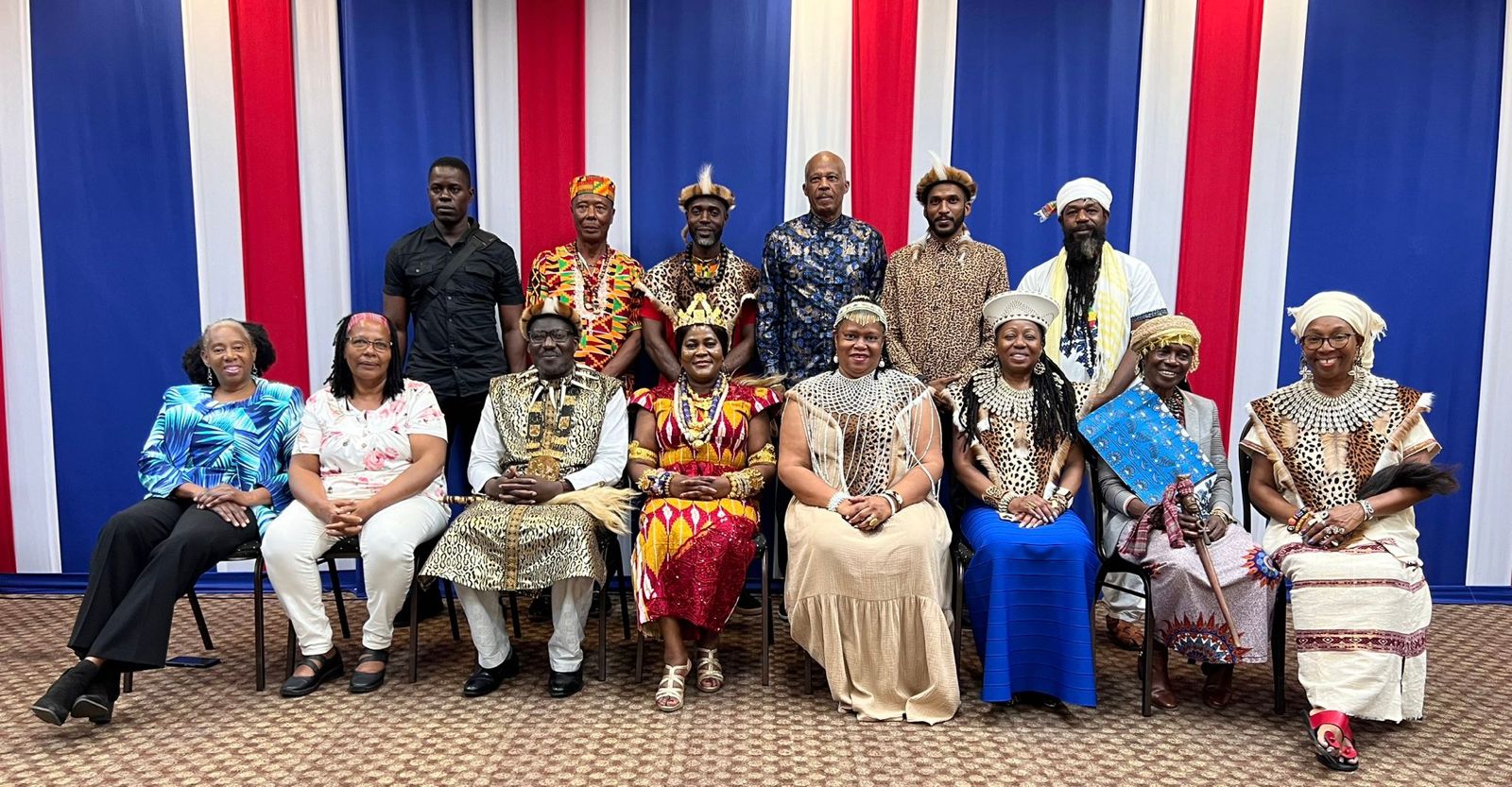“The Maroons: True founders of Modern-Day Jamaica” – Professor Sir Hilary Beckles at Historic Unity Meeting.
In a momentous, historic gathering at The University of the West Indies, Mona Campus recently, leaders from the maroon communities of Jamaica discussed and took steps towards reconciling differences at a meeting hosted by Professor Sir Hilary Beckles, Vice Chancellor of The UWI – enstooled Papa Osikol II. This reconciliation gathering which took place on 8 January, followed the success of the 286th Maroon Festival on January 6, themed “Return to Accompong: Return to Your Roots,” which attracted a mammoth crowd from Jamaica and beyond, to commemorate this significant historical event.
The leaders came together to address a number of challenges within maroon communities with the purpose of forging ahead in unity.
The AIDO African royal delegation led by His Highness Papa Paul J. Eganda I, President of AIDO Network International, which participated in the annual commemorative celebrations held in Cockpit Country, St. Elizabeth, also met with the maroon leaders. These included: Gaamang Gloria “Mama G” Simms of the Maroon Women Network and Charlestown with Gaama Akin; Colonel Lloyd Lattibeaudiere and Secretary Jacqueline Phillips of Scott’s Hall; Chief Richard Currie, Ambassador Anu El and Br. Roy Harris of Accompong.
Professor Beckles recognized the meeting between the African royals and the Maroons as a “historic moment” and paid tribute to the heroic struggle of the Maroons which he said represented the interests of Africans in Jamaica and the Caribbean for hundreds of years with dignity. “The Maroons and Tainos were the first to consolidate freedom, equality and justice in the hills of Jamaica, demonstrating a new way to live in resistance to slavery and put Jamaica on the road to freedom and democracy,” he said.
The focus of the discussions was on strategies to provide practical support for the economic and social development of maroon communities in Jamaica and on advocacy for their active engagement and respect for the cultural and economic rights of Maroon and other indigenous communities, in the ongoing constitutional reform process in Jamaica.
Professor Beckles emphasized that “the freedom intrinsic to the Jamaican sovereignty resides historically, ancestrally among the Maroons of Jamaica and that is the fundamental principle on which we should depart.” He called for the “recognition of the Tainos and the Maroons as the first people of Jamaica – the first people in the context of slavery, the first people in the context of colonization; they are the ones who put Jamaica on the road to modernity, on the road to democracy, on the road to freedom,” and they should be celebrated for their tremendous contribution.
He concluded that “Jamaica has to find a creative legal strategy, an imaginative, constitutionally perceptive strategy to recognize these first principles and to craft a constitution that places at the centre, the sovereignty of the Maroon people of Jamaica, the true founders of modern-day Jamaica.”
“I hope Jamaican people will dig deep into their history, dig deep into their spirit and their consciousness and push the Maroons into the vanguard to continue their journey into the future of liberty and justice,” he said.
His Highness Paul Eganda explained that the AIDO Royal delegation was visiting Jamaica to show solidarity with the Maroons and join the celebration of the 286th anniversary of the 1738 Maroon treaty with the British. The delegation also sought to continue building a relationship with the Maroons, of cooperation based on Pan-African principles, which commenced during a visit of African kings and queens from Uganda, Cameroon and South Africa who are part of the AIDO royal community, to Accompong in March 2023.
“It is about unity and respect among each other and working together as Maroons for the greater purpose…We need to work together as Maroons because together we are stronger, and we can achieve more…Our work is really to listen and to see how to move forward in unity,” HH Paul Jones Eganda said.
Chief Richard Currie, enstooled Papa Odwe II, Paramount Chief of Accompong – in March 2023 by the AIDO Royal Community, contributed historical context and firm recommendations to the discussions specific to the Accompong Maroon community he leads, pointing out that Accompong was never colonized by the British or any other colonial power.
He highlighted the challenge that much of maroon history is not properly documented and is largely oral history. As a result, “we live in a Jamaica today that underplays the importance of that history and in doing so has allowed elements of society such as the media to perpetrate the misinformation, the misguided information that has further separated the people from one another – the people in the mountains from the people on the plains.”
In relation to constitutional reform and the transition to a republic, he emphasized the need for proper consultation with the Maroons to address concerns about their livelihoods as it relates to their land, their status and the posterity of future generations. “As a collective here, there’s a responsibility to ensure that everyone is represented in the conversation and clearly defined understandings can be arrived at as to what the new Jamaica looks like and the relative treatment or acceptability of the status of these indigenous people that includes the Maroons, the Tainos, the Rastafari, and everyone who identifies as a free man,” Paramount Chief Currie said.
Gaamang Gloria “Mama G” Simms of the Maroon Women’s Network Suriname and representing Charlestown Maroons stated: “One thing Maroons have preserved is family…slavery and colonialism brought down family life and the Maroon families know what land and property rights mean to us.”
She further emphasized that “we need government of Jamaica to know that the gold mine is the minds of the people and we Maroons stand for that…what would’a happen if we didn’t fight…I give thanks for all of my ancestors from Africa who came here and stood up and said if we perish we perish but we gon’ fight. As Queen Nanny said: she knows to fight the enemy but she didn’ learn to fight her own.”
Colonel Lloyd Lattibeaudiere of Scott’s Hall Maroons shared personal insights, expressing the urgent need for collective action. He highlighted the suffering within maroon communities and emphasized the importance of a unified approach to address challenges with long-term engagements to progress forward. “It is about what we need to accomplish together…We need to carry everyone along it is too many people getting leave behind and we need to say something about it…they have to talk to us but we need to come together.” He further highlighted the importance of having representation for maroon communities within the Jamaican Parliament with the former Maroon Secretariat or similar entity. He emphasized that “Maroons cannot be left out of the conversation and plans for the future of Jamaica.”
Dr. Hilary Brown, CARICOM Secretariat, enstooled Queen Asianut Acom II, highlighted the commitment made by the AIDO Royal Community in February and December 2023, to return in January 2024 for the Accompong annual January 6th Festival and respectfully support the collective reunification action among maroon communities of Jamaica beyond old and new challenges. “From the beginning, the AIDO Royal Community and His Highness (Papa Ateker) has had a very strong interest in the maroon communities, recognizing your central place in the history of Jamaica and the way in which you have facilitated the continuity of African traditions and the freedom that we all enjoy today. We encourage and wish to see how unity may be forged moving forward based on the importance of maroon age in the history of Jamaica.”
The meeting agreed on follow up initiatives and next steps, including organizing a 3-day symposium during 2024 at The UWI to highlight and document maroon history; advocacy for recognition of the Maroon’s pivotal place in Jamaica’s history and adequate consultation with the Maroons in the process of constitutional reform; launching a campaign to correct historical injustices with accurate refocusing and rebranding of the maroon legacy and narrative within Jamaican history. Maroon Leaders in attendance proposed regular quarterly meetings, intervention strategies, and a calendar of existing ancestral sacred events hosted by respective communities to strengthen unity and address practical challenges faced by maroon communities.
The Maroon Unity Reconciliation Gathering marked a significant step towards solidarity, historical justice, and a united front for Jamaica’s indigenous voices. The diversity of opinions expressed showcased the intellectual strength, discipline, and ancestral harmony within the maroon community, signalling a new chapter in their shared history.
Other members of the AIDO Royal African Delegation in attendance included: Her Majesty Queen Vickylextar Okang-Sowah and Lady Chrystal Bureau of the Omanye Kingdom, Ghana; Queen Mother Dr. ChenziRa Hajila Adeke Davis Kahina, Pokomo Royal Kingdom and the Caribbean Pan-African Network; HRH Queen Ikatekit Gamachana/ Jenny Abbensetts and Chief Baiba/Carlton Darby, both of the Pokomo Royal Nation, Kenya and QM. Laleta Davis Mattis, Chairperson, Jamaica National Council on Reparations, enstooled Queen Mother Atiang II.
AIDO MANAGEMENT


